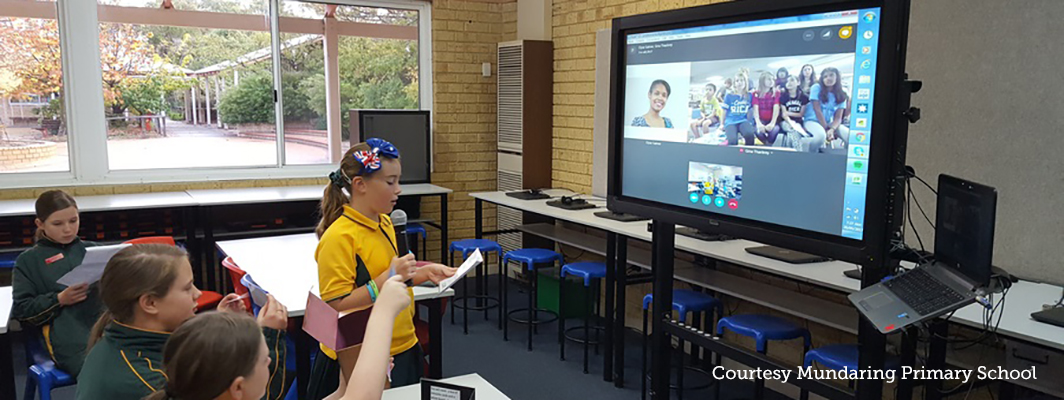
We explored how students can “Play to Learn” in the most recent Learning Studios design challenge, which asked students to design a game of any format that helps the player learn something new.
The design challenge culminated in the Play to Learn Virtual Game Exchange, where students connected on Skype to play their games with students at other Learning Studio sites. One of these connections was between Mundaring Primary School in Mundaring, WA, Australia, and Skyline Elementary School in Solana Beach, CA, USA.
The students at Mundaring Primary School shared their trivia game, “Jomasika Cards,” named after Joel, Margot, Jessica, and Karla, the student designers of the game. Joel says their group was inspired by another card game but “changed heaps of the game so the cards were to do with history, celebrity trivia, marine life and current affairs.” They quizzed the students from Skyline Elementary School with multiple-choice questions such as, “What country attacked Britain in 1518?” (the answer: Spain) and “What is the name of a baby swan?” (the answer: a Cygnet).
This was followed by Skyline Elementary School’s demonstration of “Connect the Clues,” a game they created to help players learn ways to be eco-friendly. The game is played in the style of Clue and requires the player to name ways to protect the environment in order to guess which three cards are concealed in an envelope.
Keira, one of the Year 5 students at Mundaring Primary School, observed, “[The Americans] had a completely different perspective on how to make board games than we did. It was really cool that one of their games had little trees and real seeds.” Adding to that observation, Year 6 student Emma said, “I learnt that Americans have a lot of games that we do not, like Candy Land.”
What started as a game exchange quickly evolved into an exploration of cultural and geographical differences. Their curiosity sparked a lively exchange about life on the other side of the world, with the students asking questions about the weather in their respective cities, why students wear uniforms at Mundaring Primary School, how their academic calendars differ, and how to pronounce “aluminum,” eliciting giggles from all sides of our Skype connection.
“I think the whole opportunity was very enriching for the students that were able to participate. My entire class was elated for the rest of the day,” reflected Jonelle Lorantas, the educator directing the Learning Studio at Mundaring Primary School. She added, “The students in my class who did not take part in the exchange are looking for an opportunity to talk to the students at Skyline after our next STEM project. Collaboration, especially cross-culturally is an essential tool that needs to be developed in today’s digital world!”
Part of HP and Microsoft’s Reinvent the Classroom initiative, the Learning Studios network inspires instructional innovation and next-generation learning experiences. Learning Studios support advanced blended learning, international collaboration, and the maker movement in education.